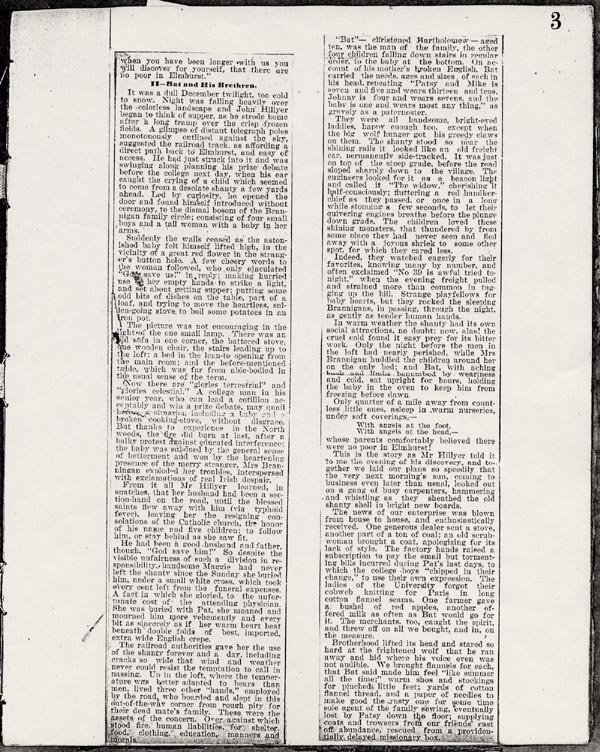Manuscript:

Transcription:
[ left column ]
when you have been longer with us you
will discover for yourself, that there are
no poor in Elmhurst." -
II-Bat and His Brethren.
It was a dull December twilight, too cold
to snow. Night was falling heavily over
the colorless landscape and John Hillyer
began to think of supper, as he strode home
after a long tramp over the crisp frozen
fields. A glimpse of distant telegraph poles
monotonously outlined against the sky,
suggested the railroad track, as affording a
direct path back to Elmhurst, and easy of
access. He had just struck into it and was
swinging along planning his prize debate
before the college next day, when his ear
caught the crying of a child which seemed
to come from a desolate shanty a few yards
ahead. Led by curiosity, he opened the
door and found himself introduced without
ceremony, to the dismal bosom of the Bran-
nigan family circle; consisting of four small
boys and a tall woman with a baby in her
arms.
Suddenly the wails ceased as the aston-
ished baby felt himself lifted high, in the
vicinity of a great red flower in the strang-
er's button hole. A few cheery words to
the woman followed, who only ejaculated
"God save us!" in reply; making hurried
use of her empty hands to strike a light,
and set about getting supper; putting some
odd bits of dishes on the table, part of a
loaf, and trying to move the heartless, sul-
len-going stove to boil some potatoes in an
iron pot.
The picture was not encouraging in the
light of the one small lamp. There was an
old sofa in one corner, the battered stove,
one wooden chair, the stairs leading up to
the loft; a bed in the lean-to opening from
the main room; and the before-mentioned
table, which was far from able-bodied in
the usual sense of the term.
Now there are "glories terrestrial" and
"glories celestial." A college man in his
senior year, who can lead a cotillion ac-
ceptably and win a prize debate, may quail
before a situation, including a baby and a
broken cooking-stove, without disgrace.
But thanks to experience in the North
woods, the fire did burn at last, after a
balky protest against educated interference;
the baby was subdued by the general sense
of betterment and won by the heartening
presence of the merry stranger, Mrs. Bran-
ningan [sic] exploded her troubles, interspersed
with exclamations of real Irish despair.
From it all Mr Hillyer learned, in
snatches, that her husband had been a sec-
tion-hand on the road, until the blessed
saints flew away from him (via typhoid
fever), leaving her the resigning con-
solations of the Catholic church, the honor
of his name and five children; to follow
him, or stay behind as she saw fit.
He had been a good husband and father,
though. "God save him!" So despite the
visible unfairness of such a division in re-
sponsibility, handsome Maggie had never
left the shanty since the Sunday she buried
him; under a small white cross, which took
every cent left from the funeral expenses.
A fact in which she gloried, to the unfor-
tunate cost of the attending physician.
She was buried with Pat, she moaned and
mourned him more vehemently and every
bit as sincerely as if her warm heart beat
beneath double folds of best, imported,
extra wide English crepe.
The railroad authorities gave her the use
of the shanty forever and a day, including
cracks so wide that wind and weather
never could resist the temptation to call in
passing. Up in the loft, where the temper-
ature was better adapted to bears than
men, lived three other "hands," employed
by the road, who boarded and slept in this
out-of-the-way corner from rough pity for
their dead mate's family. These were the
assets of the concern. Over against which
stood fire, human liabilities, for shelter,
food, clothing, education, manners and
morals.



